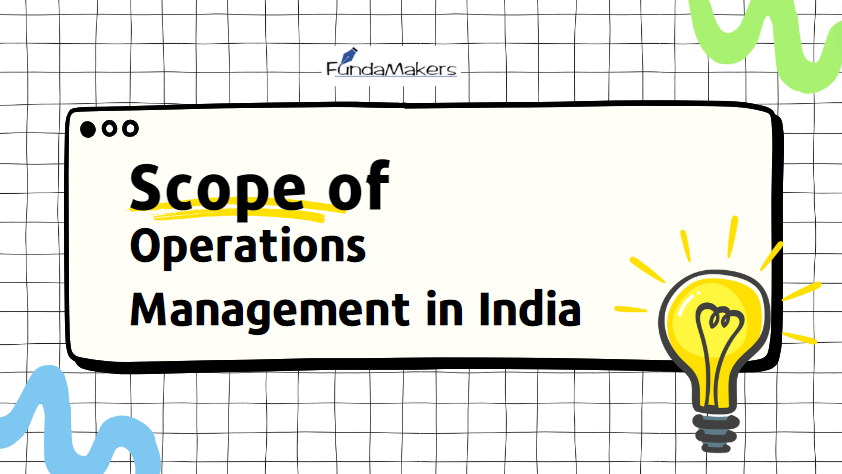The field of operations management is concerned with the creation and delivery of goods and services through the efficient management of processes and resources. It was not until the early 20th century that it became a distinct discipline, making it a relatively recent field. All facets of an organization’s operations, such as process design, planning, control, and execution, are under the purview of operations management.
The goal of operations management is to guarantee the effectiveness and efficiency of an organization’s activities. The nature, application, and foundations of operations management will all be covered in this blog post. We’ll also talk about a few of the difficulties operations managers encounter.
Elements of Operations Management
- Inventory Management
- Just In Time
- Materials Requirement Planning
- Total Quality Management
- Forecasting
Career After MBA in Operations Management
- Operation Manager
An Operations Manager is primarily responsible for ensuring that the company’s operations run smoothly and efficiently. This role involves adhering to best practices and overseeing daily business activities. Additionally, developing and refining business strategies is a key aspect of the position. An Operations Manager plays a crucial role in optimizing the internal processes of a company. Their responsibilities include overseeing day-to-day operations to ensure that all activities align with the organization’s goals and standards. They are tasked with implementing best practices to improve efficiency and productivity across various departments.
Furthermore, they are responsible for managing and leading teams, which involves setting performance goals, providing training, and fostering a positive work environment. Effective communication and problem-solving skills are essential, as Operations Managers must address any issues that arise promptly and efficiently.
The compensation for this role typically ranges from 6 to 7 lakh per annum (LPA), depending on the level of experience and the specific industry.
2. Supper Chain Manager
A Supply Chain Manager is responsible for acquiring the necessary materials and goods to ensure uninterrupted production processes. Their main objective is to maintain a consistent flow of supplies, preventing any disruptions in the production line. In addition to managing inventory levels and supplier relationships, Supply Chain Managers are involved in developing and implementing strategies to optimize the supply chain. This includes negotiating contracts with suppliers, monitoring performance metrics, and identifying opportunities for cost savings and process improvements.
Supply Chain Managers are also responsible for forecasting demand and planning inventory needs to avoid both shortages and excess stock. They use data and analytics to make informed decisions and enhance the efficiency of the supply chain.
The typical salary for this role ranges from 6 to 12 lakh per annum (LPA), depending on experience, industry, and the complexity of the supply chain operations.
3. Operations Consultant
An Operations Consultant focuses on optimizing the internal operations of an organization to ensure smooth and efficient functioning. They work to enhance supply chain demand and streamline processes, adhering to best practices while minimizing analytical errors. Operations Consultants must utilize data-driven insights to make recommendations and guide the implementation of best practices. They are responsible for developing and refining processes, ensuring that operations are both effective and adaptable to changing business condition.
n Operations Consultant’s role may also include training staff and developing processes to improve skills and operational capabilities within the organization. Their objective is to create a more agile and responsive operational framework that supports the organization’s goals. The compensation for this role varies widely, ranging from 2 to 15 lakh per annum (LPA), depending on experience, the scope of the consultancy, and the complexity of the projects undertaken.
4. Inventory Manager
An Inventory Manager primarily concentrates on devising and implementing strategies to minimize inventory costs. Their key responsibility is to manage and optimize inventory levels to reduce expenses while maintaining efficient operations. Additionally, they must ensure that customer expectations are met and work to enhance overall customer satisfaction.
Beyond cost reduction, an Inventory Manager is responsible for maintaining accurate inventory records and ensuring timely availability of products. This involves monitoring inventory levels, forecasting demand, and coordinating with suppliers to prevent stockouts or overstock situations. They utilize inventory management software and data analytics to make informed decisions and streamline inventory processes.
In addition, Inventory Managers play a crucial role in improving operational efficiency and supporting sales efforts by ensuring that the right products are available at the right time. They collaborate with various departments, including procurement, sales, and logistics, to align inventory practices with overall business goals. Effective communication and problem-solving skills are essential as they address any issues related to inventory discrepancies or supply chain disruptions.
The salary for an Inventory Manager ranges from 1.6 to 9.9 lakh per annum (LPA), depending on experience, the scale of inventory operations, and the industry in which they work.



